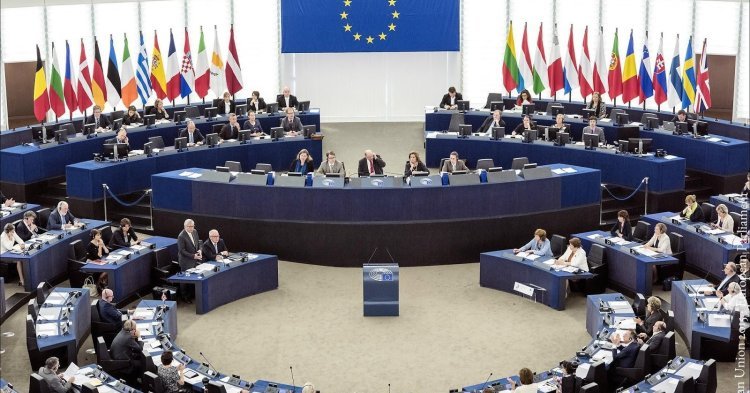Criticism 1: An institutional “democratic deficit”
First, it is worth noting that the European construction was not criticised for its undemocratic feature at the beginning of the project. The fact that it only had limited powers, over the coal and steel markets, might be a good explanation. Nevertheless, the democratic issues gained visibility thanks to the Single European Act (1987) and the Maastricht Treaty (1992) since those agreements transferred political power from the national states to the European organisation. [1]
The European institutions have been able to shape the way citizens live. Have they been legitimate? Kübra Dilek Azman asserts that this “transfer of political decisions and allocations from the national to the European level has weakened democratic influence and control at the national level without having been compensated by equally strong democratic institutions and processes at the European level”.
To address the criticisms, European actors decided to politicise the way the European Community was working. The first direct election of MEPs had already been organised in 1979, and the Maastricht Treaty increased the influence of the European Parliament by establishing the so-called co-decision procedure which authorises the Parliament to better take part in the European legislative process. It ensured that if the European Parliament disagreed with a piece of legislation included in a limited list of subjects, the law could not be passed.
Although these reforms democratised the European Union by giving more power to the people through the Parliament, their impact is limited since this institution’s power remained constrained. The member states remain the main actors alongside institutions headed by non-elected experts, like the European Court of Justice, which are criticised for not being representative.
Criticism 2: An organisation not supported by the demos
Beyond the institutional criticism, another criticism has emerged more recently. It is linked to the fact that since 1999, the turnout in European elections has never exceeded 50%. This leads us to think that the European Union no longer matters for a majority of citizens, and to ask the following question: to what extent is a political organisation democratic if it is not supported by its demos?
In order to tackle this issue, European actors proposed to set up a more participatory democracy by promoting transparency. More precisely, pieces of legislation were passed from 1999 to 2001 which made the public release of working papers and reports of meetings compulsory in order to raise citizens’ awareness. Furthermore, European actors also promoted the direct participation of citizens. Indeed, the Lisbon Treaty introduced the European Citizens’ Initiative (ECI) which allows EU citizens to participate directly in the development of EU policies.
However, the ECI procedure is very demanding, which explains why very few initiatives have been launched since the introduction of the mechanism in 2012. [2] On the other hand, already in 2003, Andrew Moravcsik [3] could predict this failure: although they now have the opportunity to vote and to participate more directly in the European policy process, why would people who didn’t vote in 1999 now participate more?
The “democratic deficit”, a questionable criticism
We have seen so far that the European Union does have unrepresentative institutions, and that it is not supported by the majority of citizens in elections. Therefore, the argument that there is a “democratic deficit” is not entirely far-fetched.
Nonetheless, I believe that this criticism might be exaggerated. The most simple way to demonstrate that is to compare the European Union to national democracies. The fact that European countries like France face the very same problem concerning the low turnout in elections - the turnout in the last French presidential election was the lowest since 1969 - and that their institutions such as the judiciary are unelected, challenges the accuracy of the twofold “democratic deficit” criticism.
More broadly, there are many other similarities between the institutions of the European Union and national democracies. I am only going to mention a few examples. First, like national democracies, the European Union is politically led by elected representatives. The only difference is that the European Union’s accountability is based on twofold pillars: the citizens’ direct will through the European Parliament and the citizens’ indirect will through the national governments. The way Commissioners are nominated is a good illustration of that since they are chosen by both the European Council and approved by the Parliament.
Second, like national democracies, the European Union has a system of checks and balances between institutions such as the Parliament, the Commission, the Council or the European Court of Justice. Last but not least, the European Union is ruled by law as all its policies are passed in accordance with treaties and, crucially, a general base of democratic values adopted with the Nice treaty in 2001. These values include freedom of speech, popular sovereignty and general interest, or in other words, values which characterise every national democracy.
To put it briefly, the European Union mainly consists of institutions similar to the national ones. In both, we have democratic elements such as accountability or a system of checks and balances, and both share the same values. However, the European Union is much more criticised for not being democratic than nation states, which leads us to think that either the “democratic deficit” of the former might be overestimated, or vice versa.
The need for a sui generis political theory
With that being said, authors like Andrew Moravcsik and Antoine Vauchez insist on not comparing the European democracy to a national democracy. On the contrary, we should take into account the fact that the EU is a sui generis entity because it’s neither a state nor a banal international institution. It has much more power than the latter and less power than the former.
Beyond this sui generis political power, the European Union also has a singular institutional scheme which is, despite the similarities to national-level counterparts, different from the typical national-level system. For instance, it is impossible to compare the Commission to a government since the executive power is shared with the European Council and the Council of the EU. Nonetheless, it is currently very difficult to assess to what extent those singular institutions are democratic since most of the political theories are state-oriented. Thus, to analyse whether the European Union matches all the required features of a European democratic regime, or in other words to address in a more detailed manner the issue concerning the “democratic deficit”, it is necessary to develop more in-depth political theories which take into account the sui generis nature of the European Union.
To sum up, all we can conclude so far are three main points. Firstly, the EU is criticised for its unrepresentative institutional scheme and for not being supported by citizens through high electoral turnouts. Secondly, this criticism concerning the European Union might be exaggerated, or alternatively the democratic feature of nation states should also be questioned. Thirdly, it is complicated to truly assess to what extent the European Union is democratic since the literature does not truly take into account the sui generis nature of the European Union.


Follow the comments: |
|
